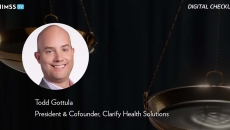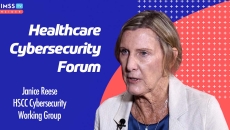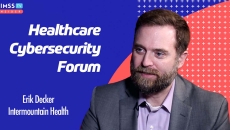HIMSS TV
Assume a bad actor is already on your health system network and set up tripwires to identify and address what is happening quickly before more damage is done, said Ali Youssef, a cybersecurity director at Henry Ford Health.
The Balgrist University Hospital staff's appetite to embrace change and innovation helped them achieve EMRAM Stage 6, while improving operational efficiency and capacity, according to Nicholas Bunger, data engineer at Balgrist.
Todd Gottula, president and cofounder of Clarify Health, says that clear case-adjusted benchmarks and patient outcome data can make conversations about AI-driven incentives much more approachable.
Transforming legacy systems and breaking down data silos after mergers and acquisitions can usher in more personalized and secure care, explains Janice Reese, advisory member of the HSCC Cybersecurity Working Group.
According to the Dubai Health Authority's Osama El-Hassan, GCC countries recognised a need to upskill existing healthcare professionals to create a local digital health workforce.
Taking care to address the challenges of securing remote patient monitoring devices will help mitigate the cybersecurity risks of hospital-at-home care, says Kevin Littlefield, principal, cybersecurity at MITRE.
Hyland Healthcare consolidates enterprise-wide imaging, helping UAE deliver complete medical records
Consolidate a hospital's image repositories into one central archive to make data accessible to patient EMRs and researchers (while also streamlining admin and security), recommends Chris Brice, EMEA healthcare director at Hyland.
A health system culture that takes patient privacy and cybersecurity seriously starts from the top down, says Renee Broadbent, CIO and information security officer at SoNE Healthcare.
The federal tools and public-private partnerships aim to help the healthcare industry manage an array of cyberattack risks, says Erik Decker, CISO at Intermountain Health.
Healthcare organizations need to prepare for cyberattacks – and communicate honestly and promptly about security events with staff and patients when they occur, says Dr. Eric Liederman, director of medical informatics at Kaiser Permanente.










